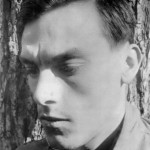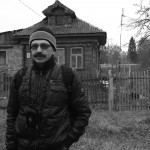Five poems by Arseny Tarkovsky with translations and an introduction by Philip Metres & Dimitri Psurtsev
Photos: Arseny Tarkovsky, Philip Metres, & Dimitri Psurtsev
Arseny Tarkovsky’s work emerges from a visionary sensibility—like Akhmatova and Mandelstam—that became his way of forging a Russian art outside of Soviet realism. Of course, it’s the music of the poems that guaranteed his reputation, as much as the vision. The following offers a range of his styles and approaches—from the free verse (a rarity in Russian poetry of the period) of Hail and The Hunt, to the more classical metrical and rhymed poems of the rest of the selection.
Dima and I considered various, sometimes radical, options. One option, briefly considered and then tossed, was the following: if, in American poetry, the “normative” mode is intonational free verse, then why not make all the “normative” Russian poems with rhyme and meter into that intonational free verse, and all the experimental (free verse or unrhymed poems) into poems with meter and rhyme? Another, more rigidly systematic one, would be simply to translate all the dactylic poems as dactylic poems, the iambics as iambic, and so on. This, frankly, seemed more possible but also literalist, since a poem in dactylic in Russian will mean something different than it will in American poetry. We decided against this rigid and misplaced conservatism, encouraged by the notion of the “semantic aura of meter.” Kirill Taranovski (and later Mikhail Gasparov) argue that each meter in Russian poetry carries with it the themes and associations of previous poets’ employment of those meters; the very idea that a poem’s meters are embedded in a larger discourse of form complicates any simplistic application of meter from poetic tradition to poetic tradition.
Our resolution of this interminable impasse between Russian metric and American poetry has been at once less systematic and more organic. Since Tarkovsky’s poetry is driven by its music, propelled by rhythm and rhyme, then our translation should make every reasonable attempt to make a similar music.
For a free verse poem like such as Hail on Petit-Bourgeois Street, we opted to remove all punctuation and create greater disjunction on the level of the line (even though normative punctuation exists in the original), in order to reproduce the astonishing effect of free verse to the Russian ear.
–Philip Metres
ГРАД НА ПЕРВОЙ МЕЩАНСКОЙ
by Arseny TarkovskyБьют часы на башне,
Подымается ветер,
Прохожие – в парадные,
Хлопают двери,
По тротуару бегут босоножки,
Дождь за ними гонится,
Бьется сердце,
Мешает платье,
И розы намокли.
Град
расшибается вдребезги
над самой липой…
Все же
Понемногу отворяются окна,
В серебряной чешуе мостовые,
Дети грызут ледяные орехи.
Hail on First Petit-Bourgeois Street
by Arseny Tarkovskytongues in the tower
pound the bells to sound
wind lifts everyone
rushes into entrances doors
slam along the sidewalk sandals
patter rain chasing behind
her heart pounds
her wet dress itches
& the roses are soaked
hail
shatters
above the very linden
still
little by little windows open—
cobblestones slick in silver scales
& children gobble up the nuts of ice
translated from Russian by Philip Metres & Dmitri PsurtsevОХОТА
by Arseny TarkovskyОхота кончается.
Меня затравили.
Борзая висит у меня на бедре.
Закинул я голову так, что рога уперлись в лопатки.
Трублю.
Подрезают мне сухожилья.
В ухо тычут ружейным стволом.
Падает на бок, цепляясь рогами за мокрые прутья.
Вижу я тусклое око с какой-то налипшей травинкой.
Черное, окостеневшее яблоко без отражений.
Ноги свяжут и шест проденут, вскинут на плечи…
The Hunt
by Arseny Tarkovsky
is done
I’m trapped
a hound hanging on my thigh
I throw my head back until my horns rest on my shoulders
and I trumpet
they slash my tendons
and jab a rifle in my ear…
He falls on his side, clinging to the wet twigs with his horns.
I can see his dim eye, a blade of grass stuck on it.
A black stiffened apple, reflecting nothing.
They’ll bind the legs together, pass a pole through, and toss it on their shoulders.
translated from by Philip Metres & Dmitri Psurtsev

